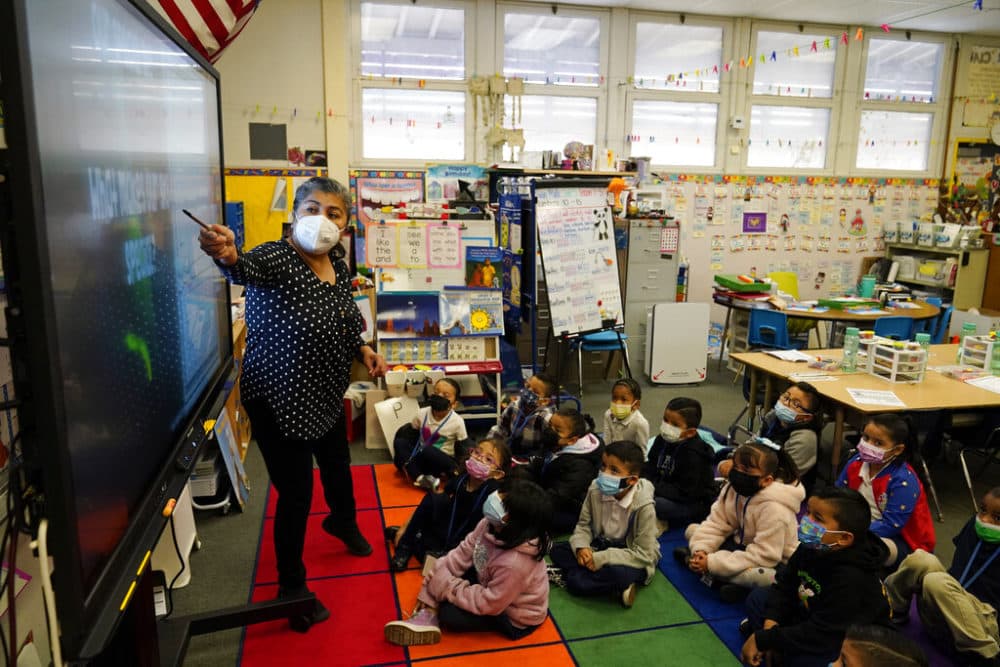Advertisement
Solutions for America's teacher shortage
Resume
The United States doesn’t have enough teachers.
“You're at the point where the governor of the state has to say, you know what, we're going to send the National Guardsmen in to help you cover classes," Jeff Hartog says.
"Never, ever thought I would get to that point.”
Education Secretary Miguel Cardona is now calling for states to spend more money, recruit more and establish better teacher training programs.
“Districts that have had robust residences do get this cadre of very well-prepared teachers," Linda Darling-Hammond, professor of education emeritus at Stanford University says. "The retention rates go up. Attrition goes down.”
But are those short-term solutions for a long-term problem?
Today, On Point: Facing and fixing America's teacher shortage.
Guests
Linda Darling-Hammond, professor of education emeritus at Stanford University. President of the Learning Policy Institute. President of the California State Board of Education. Co-author of Empowered Educators. (@LDH_ed)
Also Featured
Penny Schwinn, Tennessee's education commissioner. (@SchwinnTeach)
Jeff Hartog, principal at Katherine Gallegos Elementary School in Los Lunas, New Mexico.
Breana Mitchell, 8th grade teacher in Atlanta, Georgia.
Interview Highlights With Education Commissioner Penny Schwinn
MEGHNA CHAKRABARTI: Penny Schwinn is Tennessee's education commissioner. And when I spoke with her, I asked her first of all, just how bad is the teacher shortage in Tennessee?
PENNY SCHWINN: We've been facing a teacher shortage since before the pandemic. We just finished our vacancy data collection and found that we have just about 1,200 vacancies in the state. And for a state the size of Tennessee, that is really significant. We've got about 10,000 students who don't have a credentialed math teacher in front of them every year. And so we take this shortage and I think the impact that it has on student achievement very seriously.
CHAKRABARTI: And as you said, this has been going on since before the pandemic. So what do you think some of the causes are?
SCHWINN: You know, I think it ranges. We have a number of teachers who are retirement eligible, and I think this is something you see across the country. Where we had a big influx of teachers 20, 25 years ago. They are now moving out of the profession and retiring. We know that teacher salary is a major driver. And also, it's just conditions.
We want to ensure that all of our teachers have the support they need so they can focus on that really important work of educating kids in their classroom, why they got in the profession. And too many have also become counselors, and nurses and social workers and playground monitors and all these other important roles. We need to make sure teachers can focus on the business of teaching, that we pay them a competitive wage and that we ensure we can let people know just how wonderful the profession is. Because I think it's the greatest job on Earth.
CHAKRABARTI: I see. So basically, it sounds like what you're saying, is the variety of factors like you said, pay for a teaching job now being far more than just classroom teaching. Those things coming together or making it less attractive for a new generation of teachers to come into the classroom. So, you know, we're seeking solutions here today. And tell us what Tennessee has started. You're launching or have launched an apprenticeship program. Tell us about that.
SCHWINN: Yes. So we are the first state in the country to get federal recognition to make teaching an apprenticeship-able profession. And what that means is that future teachers can now apply in partnership with their and perhaps the state and their district to become apprentices. That means that through federal labor dollars, it pays for things like tuition, books and materials. It ensures that incoming teachers get what we know is best practice.
So they are studying under a mentor or master teacher for up to three years, really studying really good practice for kids. And then they're getting their either credential or their degree in the evening. This allows for folks, for career changers to support their families financially because they are getting a living wage as they work in schools. They get the benefits of federal apprenticeship. So that means that, you know, we had a teacher in her car broke down. Being an apprentice means that that was paid for, as was child care and Uber.
So lots of other benefits to make to reduce the financial barriers to becoming a teacher. Ensure that on the first day, they have three years of experience. And to get more folks into the profession much earlier, because now it can pay for those critical junior and senior years of college.
CHAKRABARTI: At the same time that you said they still have to take classes in the evening to receive what, a credential of some kind?
SCHWINN: Yeah, that's right. So depending on where you're coming in, so if you have if you have a college degree, then you're taking classes in the evening to get your teaching credential or license. And oftentimes as well as your master's degree. And if you're, let's say, a paraprofessional who really wants to take that next step to becoming a teacher, and we've got so many examples of that throughout Tennessee, then you are taking classes at night to earn your bachelor degree on top of your license and oftentimes your masters as well. Because we're not reducing rigor, we're just making sure that we can have a much stronger pathway into the profession.
CHAKRABARTI: OK, so this apprenticeship program is absolutely fascinating. I'm seeing here that it was launched ... or at least the federal funding, the $20 billion was secured in October of 2020. So the program ... does it have any time actually under its belt or did the pandemic disrupt it?
SCHWINN: You know, we have been accelerating forward in the pandemic. So our first our first partnership was with Clarksville-Montgomery and that we started funding in 2019. So those future teachers are graduating this August. It's been incredible to see their growth over the last two or three years. And then we saw so many other districts really interested in this pipeline that we went from one program in 2019.
We now have 65 across the state, even during the pandemic. I think people are looking for really good solutions that work. They're looking for solutions that could great people in the classroom and frankly, solutions that help to diversify the pipeline, which is a big priority across the country. And this does all of those things.
CHAKRABARTI: Well, quite frankly, sometime in the near future, I'd love to catch up with some of the teachers in that first crop of apprenticeship graduates. But let me ask you, I mean, it makes perfect sense that a profession like teaching would benefit from an apprenticeship program. And obviously, you still have to have a license as well. But why still require things like a master's degree? I mean, is that really necessary if teachers or future teachers are getting three years of extensive training in the classroom under a master teacher through this program?
SCHWINN: Yeah, it's a great question, and I think that's where we want to make sure that we are maximizing the future benefit and frankly, financial benefits for our future teachers. We know that our school districts often pay more for those teachers who have earned a master's degree. And so if that is still a pathway that we can still fund and is open for future teachers, we want to make sure that we open all of those pathways indoors.
But in terms of what makes it really, really good teacher, I'll tell you from personal experience, I learned more from watching my mom. 37 years in the classroom and her exceptional practice and results she got for kids, being able to replicate that. And the data and research shows when we have future teachers watching, studying the pedagogy and being able to plan and co-work with those master teachers.
They are exceptionally higher performing in that first year. So I would agree that that's going to be the special sauce that makes incredible teachers in classrooms. And we have a responsibility to ensure that we create as many pathways as possible so that we can pay our teachers even more. And a master's degree often does that.
CHAKRABARTI: Well this grow-your-own strategy is $20 million in federal funds. And I think you I'm seeing here 14 colleges and universities and teacher training programs and more than 60 school districts now in Tennessee.
SCHWINN: That's right. We have started with it just takes one. And then we saw it work and grow, and we've got lots of folks signed on. But I think what's really important about this is we know this funding or ARP funding is one time, it's federal funds. And so by having this federal apprenticeship, this becomes a sustainable source of funding because we can use those federal dollars that come to states every single year. So now we have a sustainable pathway to make it free to become a teacher, and pay teachers to do so.
CHAKRABARTI: Well, Penny Schwinn is the education commissioner for the State of Tennessee. Commissioner Schwinn, thank you so much for joining us today.
This program aired on April 5, 2022.

